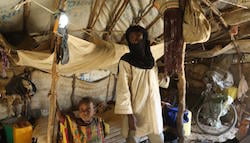DFID and Moving Energy are backing clean energy projects to boost health and enterprise in the Kakuma refugee camp. Refugees in Kenya’s Kakuma refugee camp, home to over 160,000 people, will benefit from greater access to affordable, clean energy for domestic use and to power ‘microbusinesses’ in camps, according to a statement issued by the Moving Energy Initiative consortium.
The projects include a solar-powered ICT and learning hub in the camp and health clinics serving refugees and the host community shifting from diesel to solar power. The projects are anticipated to show that renewable energy technologies can save money that can instead be reinvested in other vital services.
Under the initiative, Kube Energy will install solar systems at two primary health care clinics operated by the International Rescue Committee (IRC) in Kakuma camp. These systems will enable IRC to reduce fossil fuel consumption by approximately 54,000 liters annually generating significant cost savings that will be reinvested in other vital services across Kakuma. The project will train local hospital staff on installing and maintaining the solar system and explore the possibility of connecting local businesses to the power supply.
The other project will see Crown Agents build a solar powered ICT and learning hub for the displaced community living within Kakuma Refugee Camp and its host community which will be used for skills training and provide additional commercial services and opportunities for local entrepreneurs. The project will also explore opportunities to use the Learning Hub as a location for selling pay-as-you-go (PAYG) solar home systems to local residents.
The project will be implemented over the next 12 months during which tangible reductions in CO2 emissions, increased access to services and livelihood opportunities will be monitored. The project aims to spur a ‘demonstration effect’ encouraging others in the sector to shift towards sustainable energy and increased energy access in displacement contexts.

